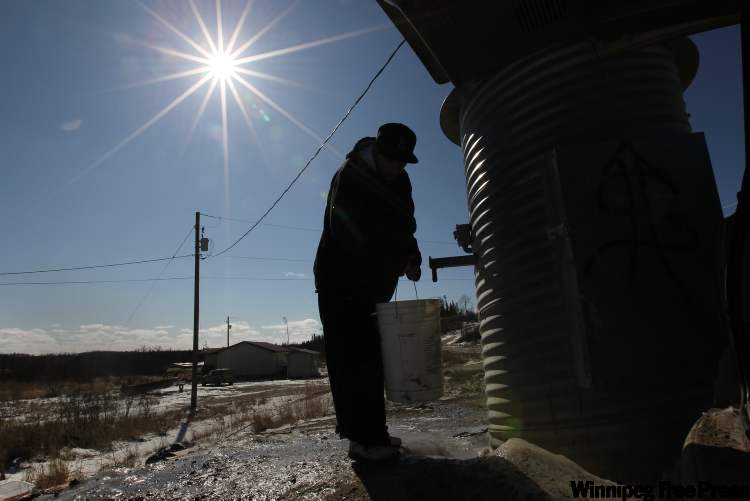Right to clean water
But legal and political hurdles make it difficult to achieve
Advertisement
Read this article for free:
or
Already have an account? Log in here »
To continue reading, please subscribe:
Monthly Digital Subscription
$0 for the first 4 weeks*
- Enjoy unlimited reading on winnipegfreepress.com
- Read the E-Edition, our digital replica newspaper
- Access News Break, our award-winning app
- Play interactive puzzles
*No charge for 4 weeks then price increases to the regular rate of $19.00 plus GST every four weeks. Offer available to new and qualified returning subscribers only. Cancel any time.
Monthly Digital Subscription
$4.75/week*
- Enjoy unlimited reading on winnipegfreepress.com
- Read the E-Edition, our digital replica newspaper
- Access News Break, our award-winning app
- Play interactive puzzles
*Billed as $19 plus GST every four weeks. Cancel any time.
To continue reading, please subscribe:
Add Free Press access to your Brandon Sun subscription for only an additional
$1 for the first 4 weeks*
*Your next subscription payment will increase by $1.00 and you will be charged $16.99 plus GST for four weeks. After four weeks, your payment will increase to $23.99 plus GST every four weeks.
Read unlimited articles for free today:
or
Already have an account? Log in here »
Hey there, time traveller!
This article was published 06/11/2010 (5516 days ago), so information in it may no longer be current.
Hint to First Nations leaders in Island Lake: After you’re finished lugging water home and digging a new hole for your outhouse, and if you’re not busy giving your kids and grandpa a sponge bath, you might want to think about hiring a lawyer.
Drinking water and sanitation are increasingly recognized internationally as human rights, which might turn out to be enforceable through the courts.
Not that it’s clear where Island Lake First Nations would get the money to pursue a legal challenge, considering hundreds of local families are crashing with relatives while they wait for the band to find enough cash to build new homes.

Some First Nations run their own businesses, which bring in revenue they could use to challenge the federal government. (Not that it’s easy to set up businesses in communities where basic services such as water and sewer are spotty.) Otherwise, the federal government is the source of all their funding.
Garden Hill band manager Steve McDougall said the idea of launching a human rights challenge or calling in the United Nations has been bandied about in the past.
“It is kind of a daunting task to do something like that.”
University of Victoria professor David Boyd said Canada’s constitutional guarantees of equality and basic services have not been put to the test by communities that lack what most Canadians would consider the minimum requirements for healthy living.
“There certainly is justification for launching a court challenge. I think a judge or a court would find it very difficult to deny a remedy to a group of people facing those kinds of unbelievable circumstances.”
In July, when the United Nations General Assembly voted to recognize safe drinking water and sanitation as a human right, Canada abstained.
Boyd has his suspicions why.
“They recognize that they have a situation on their hands where they’re not fulfilling the right to water for a significant proportion of the Canadian population.”
The Lubicon Lake Cree in Alberta went through all the expense and paperwork of appealing to the UN’s human rights committee 20 years ago, which embarrassed the federal government, but hasn’t so far resulted in running water for the community. The committee has no real power, just moral suasion, Boyd said.
The UN regularly decries the generally poor conditions on Canadian reserves, but no one appears to have drawn its attention specifically to other First Nations without running water such as Pikangikum, Ont., and the Island Lake region of Manitoba. Groups must have exhausted all domestic legal remedies before the UN human rights committee will step in.
Winnipeg lawyer Merrell-Ann Phare, whose book on indigenous water rights was published last year, said it’s clear First Nations have water rights they never gave up when they signed treaties — including the right to sufficient and safe drinking water.
The purpose of the treaties was to create viable communities, she said. Something as fundamental as drinking water would have been part of expectations on both sides.
“I think the issue is that now it’s hard for one side to live up to their end of the deal,” Phare said.
Some Island Lake leaders are reluctant to publicly criticize the federal government in case that jeopardizes the progress they’ve made in recent years.
“The regional director in Indian and Northern Affairs Canada… tries very hard to get the funding that’s needed in this region. The challenge they have is that they’re competing with other regional directors in other provinces,” said Manitoba Grand Chief Ron Evans.
He said officials have discussed asking United Nations human rights investigators to visit Manitoba’s most neglected First Nations.


